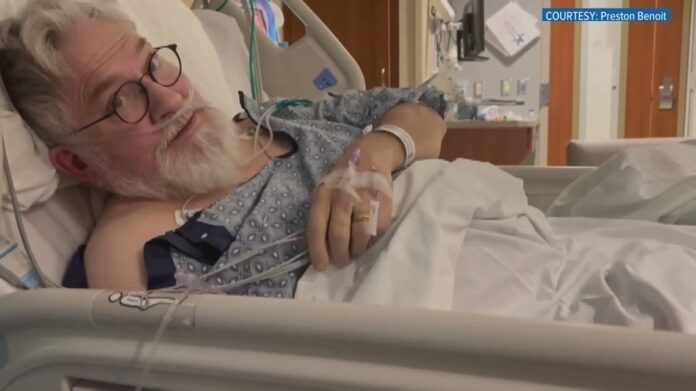Preston Benoit says what felt like a bad headache almost ended his life while on vacation last fall.
GATLINBURG, Tenn. — Preston Benoit, who lives in Bakersville, NC, said he’s readjusted to life back home after spending several months in Knoxville undergoing treatment for a stroke he experienced while on vacation in Gatlinburg last October.
Benoit, a 64-year-old retired IRS employee, said what initially felt like a bad headache escalated to first responders in Gatlinburg rushing him to the Fort Sanders Regional Medical Center.
“I needed to go to Knoxville or Nashville, and my husband wanted me to go to Nashville … and they said, ‘We don’t think he’ll make it,” Benoit said. “It’s like, ‘Okay. How about Knoxville then?’ They still thought I wasn’t going to make it.”
Benoit’s husband, then family, followed him to the Neurological Intensive Care Unit at Fort Sanders. Doctors there, like Dr. S. Arthur Moore, the chief of neurology for Covenant Health, have treated thousands of strokes with what he described as world-class techniques.
Dr. Moore, originally from Greeneville, said Tennessee is a member of the “Stroke Belt,” areas predominantly in the Southeast that have a higher prevalence of strokes than the rest of the country.
“There’s a lot more smoking for instance in the Southeast than other parts of the country. There’s a lot more untreated high blood pressure and high cholesterol. We have some of the highest diabetes rates in the country as well,” he said.
A survey by the Centers for Disease Control, published in 2024, also labels Tennessee as part of the Stroke Belt. The survey found that Tennessee was one of 10 states that experienced a statistically significant increase in the prevalence of strokes between 2011 – 2022.
Dr. Moore said time-tested precautions, like the B.E.F.A.S.T assessment, and responding quickly to a potential stroke are still essential elements of effective treatment.
“The longer you wait, the less chance there is of a good recovery. So, giving it at one hour is better than giving the medicine at two hours or three,” he said.
Benoit credited the support of his friends, family and the entire staff of the Neurological ICU at Fort Sanders for supporting him through months of physical and speech rehab that began last November and ended this March.
“I used to be very, my husband likes to say, ‘black and white, cut and dry.’ Life isn’t like that, so I’m not like that anymore,” he said.
